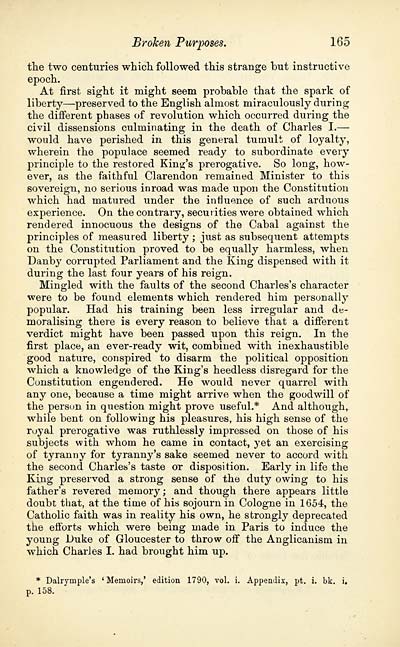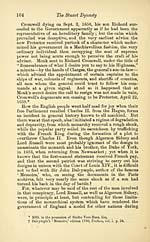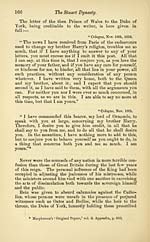Stuart dynasty
(185) Page 165
Download files
Complete book:
Individual page:
Thumbnail gallery: Grid view | List view

Broken Purposes. 165
the two centuries which followed this strange but instructive
epoch.
At first sight it might seem probable that the spark of
liberty — preserved to the English almost miraculously during
the different phases of revolution which occurred during the
civil dissensions culminating in the death of Charles I. —
would have perished in this general tumult of loyalty,
wherein the populace seemed ready to subordinate every
principle to the restored King's prerogative. So long, how-
ever, as the faithful Clarendon remained Minister to this
sovereign, no serious inroad was made upon the Constitution
which had matured under the influence of such arduous
experience. On the contrary, securities were obtained which
rendered innocuous the designs of the Cabal against the
principles of measured liberty ; just as subsequent attempts
on the Constitution proved to be equally harmless, when
Danby corrupted Parliament and the King dispensed with it
during the last four years of his reign.
Mingled with the faults of the second Charles's character
were to be found elements which rendered him personally
popular. Had his training been less irregular and de-
moralising there is every reason to believe that a different
verdict might have been passed upon this reign. In the
first place, an ever-ready wit, combined with inexhaustible
good nature, conspired to disarm the political opposition
which a knowledge of the King's heedless disregard for the
Constitution engendered. He would never quarrel with
any one, because a time might arrive when the goodwill of
the person in question might prove useful.* And although,
while bent on following his pleasures, his high sense of the
royal prerogative was ruthlessly impressed on those of his
subjects with whom he came in contact, yet an exercising
of tyranny for tyranny's sake seemed never to accord with
the second Charles's taste or disposition. Early in life the
King preserved a strong sense of the duty owing to his
father's revered memory ; and though there appears little
doubt that, at the time of his sojourn in Cologne in 1654, the
Catholic faith was in reality his own, he strongly deprecated
the efforts which were being made in Paris to induce the
young Duke of Gloucester to throw off the Anglicanism in
which Charles I. had brought him up.
* Dalrymple's ' Memoirs,' edition 1790, vol. i. Appendix, pt. i. bk. i.
p. 158.
the two centuries which followed this strange but instructive
epoch.
At first sight it might seem probable that the spark of
liberty — preserved to the English almost miraculously during
the different phases of revolution which occurred during the
civil dissensions culminating in the death of Charles I. —
would have perished in this general tumult of loyalty,
wherein the populace seemed ready to subordinate every
principle to the restored King's prerogative. So long, how-
ever, as the faithful Clarendon remained Minister to this
sovereign, no serious inroad was made upon the Constitution
which had matured under the influence of such arduous
experience. On the contrary, securities were obtained which
rendered innocuous the designs of the Cabal against the
principles of measured liberty ; just as subsequent attempts
on the Constitution proved to be equally harmless, when
Danby corrupted Parliament and the King dispensed with it
during the last four years of his reign.
Mingled with the faults of the second Charles's character
were to be found elements which rendered him personally
popular. Had his training been less irregular and de-
moralising there is every reason to believe that a different
verdict might have been passed upon this reign. In the
first place, an ever-ready wit, combined with inexhaustible
good nature, conspired to disarm the political opposition
which a knowledge of the King's heedless disregard for the
Constitution engendered. He would never quarrel with
any one, because a time might arrive when the goodwill of
the person in question might prove useful.* And although,
while bent on following his pleasures, his high sense of the
royal prerogative was ruthlessly impressed on those of his
subjects with whom he came in contact, yet an exercising
of tyranny for tyranny's sake seemed never to accord with
the second Charles's taste or disposition. Early in life the
King preserved a strong sense of the duty owing to his
father's revered memory ; and though there appears little
doubt that, at the time of his sojourn in Cologne in 1654, the
Catholic faith was in reality his own, he strongly deprecated
the efforts which were being made in Paris to induce the
young Duke of Gloucester to throw off the Anglicanism in
which Charles I. had brought him up.
* Dalrymple's ' Memoirs,' edition 1790, vol. i. Appendix, pt. i. bk. i.
p. 158.
Set display mode to:
![]() Universal Viewer |
Universal Viewer | ![]() Mirador |
Large image | Transcription
Mirador |
Large image | Transcription
Images and transcriptions on this page, including medium image downloads, may be used under the Creative Commons Attribution 4.0 International Licence unless otherwise stated. ![]()
| Histories of Scottish families > Stuart dynasty > (185) Page 165 |
|---|
| Permanent URL | https://digital.nls.uk/94819986 |
|---|
| Description | A selection of almost 400 printed items relating to the history of Scottish families, mostly dating from the 19th and early 20th centuries. Includes memoirs, genealogies and clan histories, with a few produced by emigrant families. The earliest family history goes back to AD 916. |
|---|

